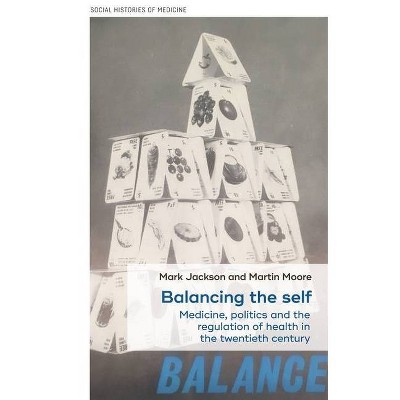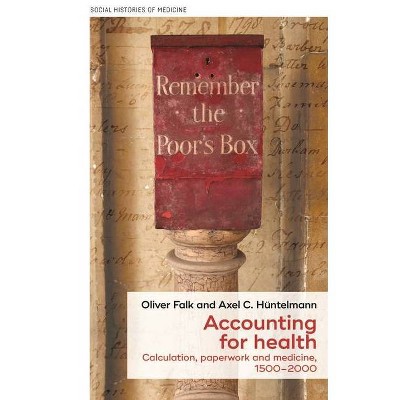Balancing the self - (Social Histories of Medicine) by Mark Jackson & Martin D Moore (Hardcover)

Similar Products
Products of same category from the store
AllProduct info
<p/><br></br><p><b> About the Book </b></p></br></br><i>Balancing the Self</i> generates new insights into emerging fields of health governance, subjectivity and balance. This volume's wide-ranging discussions will be of interest to historians of medicine, sociologists, social policy analysts, and social and political historians, as well as lay and professional readers.<p/><br></br><p><b> Book Synopsis </b></p></br></br><p>Many health, environmental and social challenges across the globe - from diabetes to climate change - are regularly discussed in terms of imbalances in biological, ecological and social systems. Yet, as contributions to this collection demonstrate, while the pressures of modernity have long been held to be pathogenic, strategies for addressing modern excesses and deficiencies of bodies and minds have frequently focused on the agency of the individual, self-knowledge, and individual choices. This volume explores how concepts of 'balance' have been central to modern politics, medicine and society, analysing the diverse ways in which balanced and unbalanced selfhoods have been subject to construction, intervention, and challenge across the long twentieth century.<br /> <br /> Through original chapters on subjects as varied as obesity control, fatigue and the regulation of work, and the physiology of exploration in extreme conditions, <em>Balancing the self</em> explores how the mechanisms and meanings of balance have been framed historically. Together, contributions examine the positive narratives that have been attached to the ideals and practices of 'self-help', the diverse agencies historically involved in cultivating new 'balanced' selves, and the extent to which rhetorics of empowerment and responsibility have been used for a variety of purposes, from disciplining bodies to cutting social security. With contributions from leading and emerging scholars such as Dorothy Porter, Alex Mold, Vanessa Heggie, Chris Millard and Natasha Feiner, <em>Balancing the self</em> generates new insights into emerging fields of health governance, subjectivity, and balance.</p><p/><br></br><p><b> From the Back Cover </b></p></br></br>Many health, environmental, and social challenges across the globe - from diabetes to climate change - are regularly discussed in terms of imbalances in biological, ecological, and social systems. Yet, as contributions to this collection demonstrate, while the pressures of modernity have long been held to be pathogenic, strategies for addressing modern excesses and deficiencies of bodies and minds have frequently focused on the agency of the individual, self-knowledge, and individual choices. This volume explores how concepts of 'balance' have been central to modern politics, medicine, and society, analysing the diverse ways in which balanced and unbalanced selfhoods have been subject to construction, intervention, and challenge across the long twentieth century. Through original chapters on subjects as varied as obesity control, fatigue and the regulation of work, and the physiology of exploration in extreme conditions, <i>Balancing the self</i> explores how the mechanisms and meanings of balance have been framed historically. Together, contributions examine the positive narratives that have been attached to the ideals and practices of 'self-help', the diverse agencies historically involved in cultivating new 'balanced' selves, and the extent to which rhetorics of empowerment and responsibility have been used for a variety of purposes, from disciplining bodies to cutting social security. With contributions from leading and emerging scholars such as Dorothy Porter, Alex Mold, Vanessa Heggie, Chris Millard, and Natasha Feiner, <i>Balancing the self</i> generates new insights into emerging fields of health governance, subjectivity, and balance.<p/><br></br><p><b> Review Quotes </b></p></br></br><br><i>Balancing The Self</i> provides a detailed study of the abstract concept of 'balance' in individual health. Each chapter provides an interesting and well-researched case study into the changing understandings and approaches to balance. Furthermore, the volume itself is well-balanced, providing a mixture of medical and political history, with an even focus across the century. The strength of the individual chapters proves this work to be useful to any scholar with an interest in selfhood and twentieth-century Britain. Louise Morgan, <i>Social History of Medicine</i><br><p/><br></br><p><b> About the Author </b></p></br></br>Mark Jackson is Professor of the History of Medicine and Director of the Wellcome Centre for Cultures and Environments of Health at the University of Exeter Martin D. Moore is a Research Fellow at the Wellcome Centre for Cultures and Environments of Health at the University of Exeter
Price History
Cheapest price in the interval: 36.95 on November 8, 2021
Most expensive price in the interval: 36.95 on December 22, 2021
Price Archive shows prices from various stores, lets you see history and find the cheapest. There is no actual sale on the website. For all support, inquiry and suggestion messages communication@pricearchive.us




















